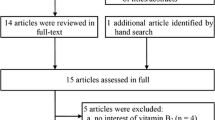Abstract
Vitamin D has important biological functions including modulation of the immune system and anti-cancer effects. There was no conclusive finding of the impact of serum vitamin D level on bladder cancer risk. A systemic review and meta-analysis was performed to assess the impact of serum 25-hydroxyvitamin D level on bladder cancer risk. The pooled relative risk (RR) with 95 % confidence interval (95%CI) was used to assess the impact of serum 25-hydroxyvitamin D level on bladder cancer risk. A total of 89,610 participants and 2238 bladder cancer cases were finally included into the meta-analysis. There was no obvious heterogeneity among those included studies (I 2 = 0 %). Meta-analysis total included studies which showed that a high serum 25-hydroxyvitamin D level could obviously decrease risk of bladder cancer (RR = 0.75, 95%CI 0.65–0.87, P < 0.001). In addition, the pooled RRs were not significantly changed by excluding any single study. The findings from the meta-analysis suggest an obvious protective effect of vitamin D against bladder cancer. Individuals with higher serum 25-hydroxyvitamin D levels suffer from less risk of subsequent bladder cancer.




Similar content being viewed by others
Explore related subjects
Discover the latest articles and news from researchers in related subjects, suggested using machine learning.References
Apolo AB, Hoffman V, Kaag MG, Latini DM, Lee CT, Rosenberg JE, et al. Summary of the 8th annual bladder cancer think tank: collaborating to move research forward. Urol Oncol. 2014.
Jemal A, Siegel R, Xu J, Ward E. Cancer statistics, 2010. CA Cancer J Clin. 2010;60:277–300.
Keimling M, Behrens G, Schmid D, Jochem C, Leitzmann MF. The association between physical activity and bladder cancer: systematic review and meta-analysis. Br J Cancer. 2014;110:1862–70.
Mohr SB, Garland CF, Gorham ED, Grant WB, Garland FC. Ultraviolet b irradiance and incidence rates of bladder cancer in 174 countries. Am J Prev Med. 2010;38:296–302.
Kaufman DS, Shipley WU, Feldman AS. Bladder cancer. Lancet. 2009;374:239–49.
Albert PJ, Proal AD, Marshall TG. Vitamin D: the alternative hypothesis. Autoimmun Rev. 2009;8:639–44.
Dixon KM, Mason RS. Vitamin D. Int J Biochem Cell Biol. 2009;41:982–5.
Plum LA, DeLuca HF. Vitamin D, disease and therapeutic opportunities. Nat Rev Drug Discov. 2010;9:941–55.
Mora JR, Iwata M, von Andrian UH. Vitamin effects on the immune system: vitamins A and D take centre stage. Nat Rev Immunol. 2008;8:685–98.
Bikle D. Nonclassic actions of vitamin D. J Clin Endocrinol Metab. 2009;94:26–34.
Bischoff-Ferrari HA. Optimal serum 25-hydroxyvitamin D levels for multiple health outcomes. Adv Exp Med Biol. 2014;810:500–25.
Ordonez Mena JM, Brenner H. Vitamin D and cancer: an overview on epidemiological studies. Adv Exp Med Biol. 2014;810:17–32.
Lee JE, Li H, Chan AT, et al. Circulating levels of vitamin D and colon and rectal cancer: the physicians’ health study and a meta-analysis of prospective studies. Cancer Prev Res (Phila). 2011;4:735–43.
Ordonez-Mena JM, Schottker B, Haug U, et al. Serum 25-hydroxyvitamin D and cancer risk in older adults: results from a large German prospective cohort study. Cancer Epidemiol Biomarkers Prev. 2013;22:905–16.
Kim Y, Je Y. Vitamin D intake, blood 25(OH)D levels, and breast cancer risk or mortality: a meta-analysis. Br J Cancer. 2014;110:2772–84.
Giovannucci E, Liu Y, Rimm EB, et al. Prospective study of predictors of vitamin D status and cancer incidence and mortality in men. J Natl Cancer Inst. 2006;98:451–9.
Amaral AF, Mendez-Pertuz M, Munoz A, et al. Plasma 25-hydroxyvitamin D(3) and bladder cancer risk according to tumor stage and FGFR3 status: a mechanism-based epidemiological study. J Natl Cancer Inst. 2012;104:1897–904.
Afzal S, Bojesen SE, Nordestgaard BG. Low plasma 25-hydroxyvitamin D and risk of tobacco-related cancer. Clin Chem. 2013;59:771–80.
Mondul AM, Weinstein SJ, Horst RL, Purdue M, Albanes D. Serum vitamin D and risk of bladder cancer in the prostate, lung, colorectal, and ovarian (PLCO) cancer screening trial. Cancer Epidemiol Biomarkers Prev. 2012;21:1222–5.
Mondul AM, Weinstein SJ, Virtamo J, Albanes D. Influence of vitamin D binding protein on the association between circulating vitamin D and risk of bladder cancer. Br J Cancer. 2012;107:1589–94.
Higgins JP, Thompson SG, Deeks JJ, Altman DG. Measuring inconsistency in meta-analyses. BMJ. 2003;327:557–60.
DerSimonian R, Laird N. Meta-analysis in clinical trials. Control Clin Trials. 1986;7:177–88.
Mantel N, Haenszel W. Statistical aspects of the analysis of data from retrospective studies of disease. J Natl Cancer Inst. 1959;22:719–48.
Egger M, Davey Smith G, Schneider M, Minder C. Bias in meta-analysis detected by a simple, graphical test. BMJ. 1997;315:629–34.
Peters JL, Sutton AJ, Jones DR, Abrams KR, Rushton L. Performance of the trim and fill method in the presence of publication bias and between-study heterogeneity. Stat Med. 2007;26:4544–62.
Mondul AM, Weinstein SJ, Mannisto S, et al. Serum vitamin D and risk of bladder cancer. Cancer Res. 2010;70:9218–23.
Pommergaard HC, Burcharth J, Rosenberg J, Raskov H. Oral chemoprevention with acetyl salicylic acid, vitamin D and calcium reduces the risk of tobacco carcinogen-induced bladder tumors in mice. Cancer Invest. 2013;31:490–3.
Krishnan AV, Feldman D. Mechanisms of the anti-cancer and anti-inflammatory actions of vitamin D. Annu Rev Pharmacol Toxicol. 2011;51:311–36.
Chen P, Li M, Gu X, et al. Higher blood 25(OH)D level may reduce the breast cancer risk: evidence from a Chinese population based case–control study and meta-analysis of the observational studies. PLoS One. 2013;8:e49312.
Chung M, Lee J, Terasawa T, Lau J, Trikalinos TA. Vitamin D with or without calcium supplementation for prevention of cancer and fractures: an updated meta-analysis for the U.S. Preventive Services Task Force. Ann Intern Med. 2011;155:827–38.
Bolland MJ, Grey A, Gamble GD, Reid IR. The effect of vitamin D supplementation on skeletal, vascular, or cancer outcomes: a trial sequential meta-analysis. Lancet Diabetes Endocrinol. 2014;2:307–20.
Conflicts of interest
None
Author information
Authors and Affiliations
Corresponding author
Rights and permissions
About this article
Cite this article
Liao, Y., Huang, JL., Qiu, MX. et al. Impact of serum vitamin D level on risk of bladder cancer: a systemic review and meta-analysis. Tumor Biol. 36, 1567–1572 (2015). https://doi.org/10.1007/s13277-014-2728-9
Received:
Accepted:
Published:
Issue Date:
DOI: https://doi.org/10.1007/s13277-014-2728-9




